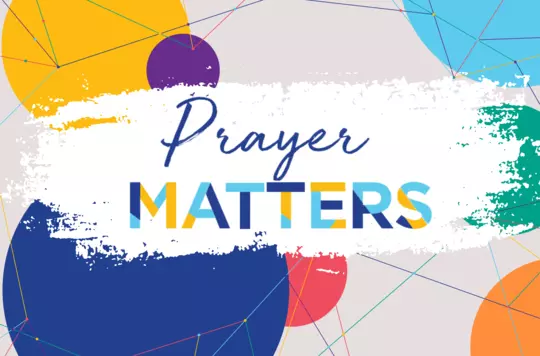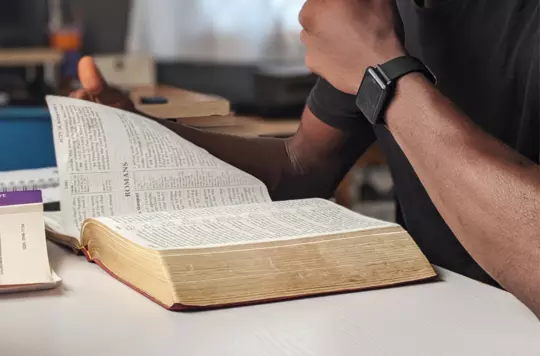20 June 2022
Isaiah 59: Facing our own faults and failings
Bible study by Major Cliff Allchin
Major Cliff Allchin considers God’s solution for people who have sinned against him.
Key text
Sometimes in our walk of faith we are faced with a question that strikes at the heart of God’s nature and his relationship with humanity. The question is often framed by the contrast between life’s pain and God’s love and omnipotence.
Isaiah 59 begins with a form of that question. The prophet asks: If God has not saved his people from their trials is it because he has lost some of his power?
The answer to this dilemma is not an easy one, for sometimes the problems we face are of our own making.
Pause and reflect
- Can you remember a time when you questioned the presence of suffering in God’s world? What pain were you going through?
- Were you able to solve this question of pain?
The Jewish people are in exile in Babylon. They are perplexed. They feel that God has somehow let them down and they begin to question his power and authority.
Isaiah concludes that God’s power has not dimmed and that the problem lies with the people. They have sinned – in their actions and their words (v3), by withholding justice with a lack of integrity (v4) and by taking wrong paths that are evil, crooked, violent and devoid of peace (vv5–8).
The result of this sin is that the Jewish nation is lost. The people have lost their standards of justice and righteousness. They are lost as a blind person can be in darkness, and deliverance seems far away (vv9–11).
Pause and reflect
- Carefully consider the images that Isaiah draws in verses 3 to 11. How do they speak to us?
- Can any of the errors of Jewish society that Isaiah depicts be seen in our own society? Who is responsible? (Read Amos 5.)
Verses 12 to 15 are, as one Bible commentator says, a ‘reality check’. The evidence of the sins committed by the Jewish nation is so heavy that the people are haunted by them. These verses resemble the anguish of Shakespeare’s Macbeth and his guilt-ridden angst: ‘Will all great Neptune’s ocean wash this blood clean from my hand? No, this my hand will rather the multitudinous seas incarnadine, making the green one red.’
Pause and reflect
- How does sin separate us from fellowship with God, and with what results (v2)? (Read Genesis 3:16–23.)
The remedy for the Jews who are in exile begins with confession. Isaiah recognises and confesses that their sins of rebellion and revolt – of treachery, oppression and injustice – have caused this departure from God’s blessings (vv12 and 13). Perhaps we, too, need to recognise that sometimes the situations and the crises we face are because of our own faults and failings – that we have sinned and need to confess that sin.
Isaiah focuses on the people’s offences, sins, iniquities, rebellion and treachery against the Lord (vv12 and 13). He says God looked and was appalled that there was no one who could stand in intercession for these people, none who could intervene (v16). God alone could achieve redemption for them through his servant.
In this lesser-known Messianic prophecy we are shown the nature of the Redeemer and the depth of his work of grace – a ministry that includes a new covenant of God’s Spirit being upon his people: the faithful, the righteous, the penitent (vv16–21).
Pause and reflect
- How do we see Isaiah’s prophecy fulfilled in the life, death and resurrection of Jesus Christ?
In her song ‘There Is a Green Hill Far Away’, Cecil Frances Alexander writes of Jesus: ‘There was no other good enough/ To pay the price of sin’ (SASB 203).
Sin, confession and redemption can be described as the three phases of our salvation:
- ‘All have sinned and fall short of the glory of God’ (Romans 3:23).
- ‘If we confess our sins, he is faithful and just and will forgive us our sins and purify us from all unrighteousness’ (1 John 1:9).
- ‘In him [Jesus] we have redemption through his blood, the forgiveness of sins, in accordance with the riches of God’s grace that he lavished on us’ (Ephesians 1:7 and 8).
Bible study by

Major Cliff Allchin
Corps Officer, Leeds Central
Discover more

Isaiah 58: The reality check
Major Carl Huggins reminds us that we are agents for transformation in others.

Prayer Matters
Daily prayers to inform, encourage and immerse the territory in prayer.

Recommended resources for devotions
Ideas for your time with God.

How do we make local mission flourish?
Lieutenant Wan Gi Lee considers the challenge of church growth.
